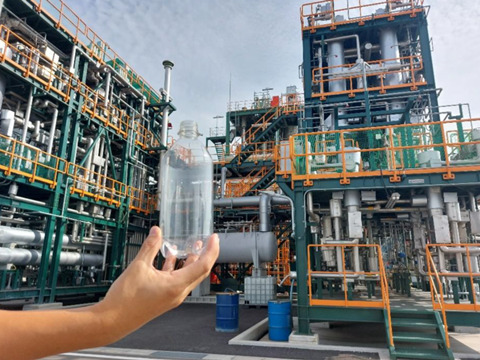
Axens is commercially licensing its Rewind PET chemical recycling process for PET waste, developed in collaboration with IFPEN and JEPLAN, in an effort to achieve circularity for plastics and further accelerate the energy transition.
In 2020, Axens, IFPEN, and JEPLAN came together in a strategic partnership to develop the Rewind PET recycling process. Rewind PET utilizes glycolysis to depolymerize PET into a BHET monomer, separating all additives and colourants to produce a purer output; this can then be sent to a polymerization plant to be re-polymerized into recycled PET.
Apparently, the technology is compatible with all types of polyethylene waste, including waste that is difficult to recycle mechanically. Its resultant rPET has reportedly been approved by ‘several major companies’ in the food packaging and cosmetics sectors.
The French Environment and Energy Management Agency (ADEME) supported the construction, commissioning, and launch of a semi-industrial Rewind PET unit in September 2023. Here the partners conducted a year-long programme of tests, culminating in the technology’s validation and commercial launch.
The test programme claims to have proven the process to be effective and reliable in the treatment of post-consumer PET waste. Both the results and launch are said to be on schedule.
Axens now plans to offer a complete Rewind PET license package. This includes basic process design, which may be modularized, as well as performance guarantees, supply of proprietary equipment, and technical support for the start-up and operation of customers’ industrial units.
Quentin Debuisschert, chairman and CEO of Axens, commented: “The Rewind PET process is part of Axens’ global strategy in the plastics circular economy, with the development and commercialization of several chemical and physical recycling processes designed to complement mechanical recycling.
“With this innovative process, we can support our clients in achieving their ambitious targets for the incorporation of recycled materials in many industrial sectors, starting with packaging and textiles.
“It is a powerful response to the challenges of ecological transition for manufacturers and brand owners looking for reliable, sustainable solutions to adapt their industrial facilities.”
Masaki Takao, representative director, president, and CEO of JEPLAN, added: “We are proud to be part of this ambitious development, with a major milestone achieved today, supporting the development of true circular economy of the polyester packaging and textile.
“JEPLAN has been a pioneer in this field, first with PRT plant in Kawasaki (packaging), then operating the first version of KHP unit (textile).
“Together with Axens and IFPEN, we are paving the way for a more sustainable future, helping the PET industry meet its recycling targets and contributing to global environmental goals.”
In other news, Carbios plans to reach a minimum annual processing capacity of 50,000 tons of prepared PET waste by signing a joint Letter of Intent with Zhink Group to build a bio-recycling plant for its enzymatic depolymerization technology in China. The move is set to drive an uptake of enzymatically recycled rPET in Asia.
A joint venture between Indorama Ventures, Dhunseri Ventures, and Varun Beverages – PepsiCo’s second-largest bottling company globally outside the US – plans to establish several greenfield state-of-the-art PET recycling facilities in India. Construction of two PET recycling facilities has already begun, with completion scheduled for 2025.
Meanwhile, Plast Nordic and Norner plan to recycle 97% of PET waste generated into the Nordics back into their raw materials using alkaline hydrolysis. The partners say that advanced recycling is the ‘only’ technology to achieve circularity without sacrificing the quality of the recyclate.
If you liked this story, you might also enjoy:
The ultimate guide to the Packaging and Packaging Waste Regulation in 2024
How are the top brands progressing on packaging sustainability?
Sustainable Innovation Report 2024: Current trends and future priorities
Everything you need to know about global plastic sustainability regulation













No comments yet